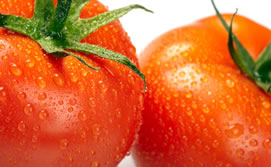For this study, the main point of reference was the principal component of the epidermis from this fruit’s skin: cutin, a bio-polyester that forms the basis for the cuticle layer which coats the surface of leaves, non-lignified stems and fruits.
Researchers from the Seville Institute of Materials Science (CSIC-US) and from the University of Málaga have patented a biodegradable plastic made from tomato skins, that has applications in the fields of food and healthcare, among others.
These experts, who work within the Government of Andalusia’s project for excellence called “Biomimicry of materials. Synthesis of bio-polyesters such as cutin and their technological and pharmacological applications”, have patented a material that has applications in the food and healthcare fields.
 The main function of this biopolymer is to avoid water loss from the cellular interior and act as an interface between the plant and the environment. José Jesús Benítez Jiménez, the leader of the project, assures that “Cutin is considered a biocompatible, biodegradable and non-toxic product that nature itself uses as a protective coating for fruits and leaves; as such, it is susceptible to being artificially adapted and used as a commercial material for packaging foods”.
The main function of this biopolymer is to avoid water loss from the cellular interior and act as an interface between the plant and the environment. José Jesús Benítez Jiménez, the leader of the project, assures that “Cutin is considered a biocompatible, biodegradable and non-toxic product that nature itself uses as a protective coating for fruits and leaves; as such, it is susceptible to being artificially adapted and used as a commercial material for packaging foods”.
The resulting, orange-colored material is viscoelastic with a “made to measure” thickness. It is innocuous, inexpensive and biodegradable, and has the same durability as the fruit’s skin. “Currently we are carrying out mechanical tests, dealing with resistance, elasticity, transparency and opacity”.
Source: Andalucía investiga